[ad_1]
Providing reservation within a reserved category on the sole basis of either caste or population is impermissible under the Constitution, the Supreme Court ruled on Thursday, as it affirmed quashing of a Tamil Nadu law for 10.5% internal quota in government jobs and educational institutions to the Vanniakula Kshatriyas community.
The Vanniakula Kshatriya community includes Vanniyars, Vanniyas, Vannia Gounders, Gounders or Kanders, Padayachis, Pallis and Agnikulas Kshatriya.
The bill to provide for reservation was introduced by previous AIADMK government at the fag-end of their government in 2021 on demand of its ally PMK, a political party representing Vanniyars.
A bench of justices L Nageswara Rao and BR Gavai held that allotting 10.5% quota exclusively for Vanniakula Kshatriyas from the 20% quota meant for all 116 most backward classes (MBCs) and de-notified communities (DNCs) breached the constitutional principles of equality under Article 14 and social justice, as laid down under Articles 15 and 16 of the Constitution.
While Articles 15 and 16 empower a state to provide reservation and other special measures for backward classes, the bench highlighed that there was no reasonable basis for treating the Vanniakula Kshatriya community any differently from other 115 communities identified by the Tamil Nadu government as MBCs and DNCs.
“Choosing a particular caste and providing a special reservation of 10.5% out of the 20% to such castes is discriminatory, in the absence of any sound differentiation from communities who are similarly situated and were, therefore, grouped together for the purposes of receiving the benefits of 20% reservation,” said the court, upholding the Madras high court order striking down the 2021 law in November last year.
The bench dismissed a clutch of appeals filed by the state government, the Pattali Makkal Katchi (PMK) – a political outfit in the state representing the interests of the Vanniyakula Kshatriyas and a host of other individuals, underlining that the 2021 law providing for internal reservation to the community was framed by the state government only on the basis of a report by the state backward classes commission that not only relied on old data from 1985, but also lacked any other rationale.
Finding fault with the commission’s recommendation, the top court noted that the state proceeded to carve out exclusive quota of 10.5% “on the basis of antiquated data” and without any assessment of the relative backwardness and representation of Vanniakula Kshatriyas and their ability to compete with the remaining 115 communities within the MBCs and DNCs.
“In the absence of any rationale for treating the Vanniakula Kshatriyas community differently, the differentiation and allocation of percentages was entirely arbitrary and falls foul of Article 14…” the bench said.
“Providing internal reservation of 10.5% … would definitely be to the detriment of other communities, in the absence of any exercise undertaken or any findings arrived at to demonstrate that members of the Vanniakula Kshatriya community are unable to compete with the remaining communities within the MBCs and DNCs,” added the bench.
Citing the constitution bench rulings in the Indra Sawhney case (popularly known as the Mandal Commission case) in 1992 and in the Jarnail Singh case in 2018, the court asserted that neither the caste nor the population alone can be a sole factor to determine internal reservation for a community and that “contemporaneous data” coupled with relative assessment were mandatory to distinguish a class within a class.
“This court is of the opinion that percentage of population of the Vanniakula Kshatriyas proportionate to the total population of the MBCs and DNCs cannot be the sole criterion for providing internal reservation… while caste can be the starting point for providing internal reservation, it is incumbent on the state government to justify the reasonableness of the sub-classification and demonstrate that caste has not been the only basis,” said the bench. The backward classes commission, in February 2021, recommended internal reservation to the Vanniakula Kshatriyas community in proportion to their population in the state.
It clarified that the state government indeed has the legislative competence to classify the Vanniakula Kshatriyas or any other community or group of communities within backward classes as a particular class for the grant of special measures but “there should be a reasonable basis for categorising such communities into a different section from the rest of the communities within the MBCs and DNCs, on grounds which cannot be superficial or illusory.”
“Equal laws would have to be applied to all in the same situation, and there should be no discrimination between one person and another if, as regards the subject matter of the legislation, their position is substantially the same…In the instant case, we see no justification for how Vanniakula Kshatriyas can be treated as a different class and meted out preferential treatment, being one amongst the 116 communities, who have all been considered on the same footing till the enactment of the 2021 Act and were, therefore, eligible to claim the benefit of undivided 20% reservation,” declared the bench.
Tamil Nadu passed a law to grant 10.5% reservation for the Vanniakula Kshatriyas community within the already available 20% quota for MBCs in February 2021, just before the state was heading to assembly polls. This law was challenged before the top court and the Madras high court simultaneously. In July 2021, the top court refused to stay the law while allowing the hearing before the high court to go on.
Subsequently, in November 2021, the high court ruled that the 10.5% quota law passed by the previous All India Anna Dravida Munnetra Kazhagam (AIADMK)-led assembly the day state elections were announced, was illegal because of a lack of quantifiable data to measure the “extreme backwardness” of the Vanniakula Kshatriyas community. It also said that the state government did not have the legislative competence to enact the law.
The state government as well as PMK challenged the high court order before the top court. The petition filed by the Tamil Nadu government said that MBCs were identified in Tamil Nadu as early as 1957 as equivalent to Scheduled Castes but without the factor of untouchability. In 2012, much after the enactment of the 1994 law providing 20% reservation for MBCs, the Tamil Nadu backward classes commission was asked by the state government to grant internal reservation within the 20% quota.
The state government claimed that the 1992 Indira Sawhney judgment allows states to sub-categorise castes – a position affirmed by the Supreme Court in its judgment on Thursday while clarifying that despite the legislative competence, a collection of contemporaneous data and assessment of relative backwardness were necessary for internal reservation.
On December 16, the bench had protected all appointments and admissions already made under the law. At the same time, the court restrained the state from making any further appointment or admissions. This order was necessary as during the pendency of the matter in the high court, nearly 75,000 students had taken admission availing the benefits under the 2021 law.
The Tamil Nadu government said that a decision on the next course of action will be taken after consulting legal experts.
“Without proper data, the previous AIADMK government hastily brought this law to provide an internal quota for Vanniyars for political reasons ahead of the assembly elections last year,” said the state’s minister for water resources and senior DMK leader Durai Murugan.
PMK spokesperson K Balu, who is one of the petitioners in the SC, said that the party has asked the state government to conduct a caste-based census. “We have asked the DMK to bring in a new legislature after the census,” Balu said. “The verdict gives room for options.”
PMK founder S Ramadoss termed the verdict a disappointment. “The PMK will continue to press chief minister M K Stalin to bring a new Vanniyar reservation Act,” he said in a statement.
[ad_2]
Source link



They play an improtant part in the lubrification process of joints and taking an anti oes will results in painful tendons cialis generic 5mg In general, most of the food that you find in the high end hotels is also available in the markets but European style food is generally reserved for the former
2008; Aneja, 2012 cialis online pharmacy Renin Immunoreactivity
cialis pills LCCC0411 Phase I Radiosensitization Study of GW572016 with Biologic Correlates in Locoregionally Recurrent Breast Cancer
DubergГ© T, BГ©nГ©zery K, Resbeut M, Azria D, Minsat M, Ellis S, Teissier E, Zaccariotto A, Champetier C, Cowen D levitra 20mg generique en ligne T3 thyrotoxicosis, in which serum T4 remains normal, is more prevalent in iodine deficient regions 296 and can be a premonitory stage of typical hyperthyroidism 297
i am so lost and everything i read online sounds so hopeless cialis 10mg The system can be triggered by sympathetic stimulation, renal artery hypotension, and decreased sodium delivery to the distal tubule